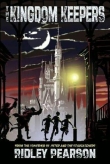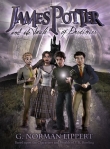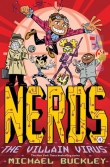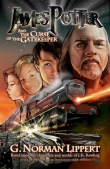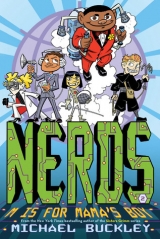
Текст книги "M Is for Mama's Boy"
Автор книги: Michael Buckley
Жанры:
Прочие детективы
,сообщить о нарушении
Текущая страница: 2 (всего у книги 11 страниц)


“Congratulations on stopping Professor Flurry and her deadly snow globe machine, Agent Gluestick,” the Hyena said via a video chat. Her signal was breaking up and full of static, but nothing could dim the former beauty queen’s bright green eyes.
“Just doing my job,” the boy replied.
“Always the humble one, huh? I hear Braceface asked for a trophy and Wheezer wanted tickets to WrestleMania. Pufferfish asked for a case of anti-itch cream, and the other one—the hyper one?”
“Flinch.”
“Yes, Flinch. He asked for something, but who can understand him? The boy talks a mile a minute.”
“I only wish we could have saved Hollywood. When the doctor turned on her machine, it was sealed in a glass globe and rolled into the ocean.”
“Eh, I was Ms. Preteen Hollywood, once. Trust me, it’s not such a big loss.”
“I heard you were on some secret mission.”
The Hyena nodded. “Can’t say much, only that it’s warm. I was tired of the long johns and mittens. So much better working for the good guys. Though I wish I were a little closer to, you know. . . ”
“Jackson?”
“If you tell, you’re a dead man!” the Hyena cried. “Listen, the world needs saving so I gotta run. Tell the gang I said hi– oh, and next time I contact you on the video screen, would you mind standing on the floor instead of the ceiling? It’s giving me motion sickness.”
Duncan Dewey leaped down from the ceiling, landing squarely on the floor. “Sorry. Force of habit.”
Suddenly there was a loud banging on the door across the room. “Hey, nerd! Open up!”
“Gotta run, too. Be careful, Mindy,” Duncan replied.
The girl growled.
“Sorry. Be careful, Hyena,” Gluestick said sheepishly.
Her face disappeared from the monitor just as a tiny blue orb floated out of a hole in the desk. It twittered as it buzzed around Duncan’s head. Then it spoke in a rather dignified voice. “The Creature is at the door, Gluestick.”
Duncan sighed. “I hear her, Benjamin.”
“People in Boston can hear her,” Benjamin replied. “Perhaps you should answer before she pounds the door down.”
Duncan opened the door a crack. Outside was something so horrible, so disturbing, so nightmarish that it would have caused a grown man to scream in terror. It was Duncan’s sister, Tanisha—or as Duncan and Benjamin called her, the Creature. The Creature was fuming mad. When she was angry, Duncan thought she resembled a pit bull sucking on a lemon. When she was happy? Well, he would say, imagine the same thing without the lemon.
“May I help you?”
“What are you doing in there?” the Creature snapped.
“I’m afraid that’s classified.”
Tanisha snarled. “More of your stupid secret agent stuff?”
“I could tell you, but then I’d have to kill you.”
She growled. “Dad set fire to the house.”
“Again?”
“Yes, again! Your crazy gadgets are impossible to use. I was nearly blasted through the bathroom window this morning using that stupid hair dryer you brought home.”
“Perhaps it’s not the hair dryer that is stupid but the person using it,” Duncan mumbled.
“What did you say?” Tanisha cried as Duncan closed the door in her face.
The little blue orb darted up to him. “Time to put away the toys?”
Duncan nodded. “I’m afraid so, Benjamin. Activate bedroom mode.”
At once the computer monitor disappeared into the ceiling, the desk flipped on its side and sank into the floor like a slice of bread into a toaster, and Duncan’s leather chair rolled away behind the wall. When the room was empty, the walls themselves slid downward, revealing a curtained window, a dresser, a mirror, and a bookshelf stuffed with books about electronics and technology. A hole in the floor opened and a full-sized bed rose to the surface. The room’s transformation was complete when a stack of Popular Mechanics magazines slid out from under the mattress.
“Now I need to get dressed for school, Benjamin,” said Duncan. “Activate wardrobe mode.”
“Of course,” the orb replied as it spun like a top. Little blue light particles swirled around the room. They danced and twirled, combining into a three-dimensional hologram of a clothing store. Now standing before Duncan was another hologram—this was the human representation of the little blue orb: America’s elder statesman Benjamin Franklin, who, like Duncan, had once been a spy. Benjamin was dressed in white stockings, breeches, and a long coat. He smiled as he pulled out a measuring tape and went about measuring Duncan’s shoulder width, arm length, and inseam.
“How about something in a powdered wig?” Benjamin suggested, holding up a bright white hairpiece.
“Hmmm, maybe a little too eighteenth century?” Duncan replied.
Benjamin put the wig back, then presented a brown pinstripe suit. “Very well. This is pure twenty-first-century class. With a button-down shirt and a gray vest you would look very hip—like a young Frederick Douglass.”
“No, I was thinking about the usual,” the boy said.
Benjamin frowned. “The usual?”
Duncan nodded.
“Green shirt, purple pants, oxfords, all clashing?” Benjamin sighed.
Duncan nodded.
“OK.” Benjamin and the store vanished, leaving just the blue orb floating in the air. It chirped and beeped, then panels on the bedroom walls slid back, revealing banks of red lasers. They scanned Duncan. His pajamas fell away with a flash as dozens of cables with mechanical hands on the ends dropped down from the ceiling. Each held a different tool: scissors, needles, thread, chalk, brushes, etc. When long swatches of thick, shiny, purple and green fabric unrolled from above, the hands went to work cutting and sewing the cloth into slacks and a shirt.
Within moments, the hands were finished and the small spy was squeezed into an eye-burning, ill-fitting outfit of clashing colors.
“Just how I like it,” Duncan said as the orb floated onto his palm. He slipped it into his pants pocket and crept into the hallway. The Creature was waiting for him, her hands clenched into fists and her mouth twisted in a snarl.
“I heard what you said,” she growled. “And now you’re going to pay.”
“You have to catch me first,” Duncan said, leaping onto the wall and using his sticky hands and feet to scurry up to the ceiling. Tanisha ran after him, leaping up and swatting at him like he was a bug as he skirted the chandelier in the dining room and raced toward the kitchen. He managed to stay just out of reach, which made her all the angrier.
Luckily, Duncan’s parents were waiting for him in the kitchen. A small but growing cloud of smoke was rising out of the toaster, and his father, Avery, dressed in work boots and overalls, was slapping at it with a dish towel. His mother, Aiah, looked on, urging his dad to calm down.
“Duncan!” said his mother when she spotted the boy. “What have I told you?”
“‘No walking on the ceiling.’ Sorry,” Duncan said, and dropped to the floor. “So, I hear we have another five-alarm inferno in here.”
Avery scowled at his son’s joke.
“OK, no sense of humor this morning,” Duncan said as he grabbed a remote control sitting on the kitchen counter. He punched in a series of numbers and a panel on the kitchen wall slid back. A tiny winged robot buzzed out carrying an even smaller fire extinguisher. It hovered over the toaster and blasted it with fire retardant until the flames were dead. Then the robot zipped back into its hidden compartment.
“Duncan, enough is enough!” Avery cried. “All the gadgets have to go! I feel like I’m trapped in a James Bond movie.”
Aiah pursed her lips. “Avery, keep it down. We don’t want the neighbors to hear. It’s a national security thing!”
Avery frowned but lowered his voice. “When we agreed to let Duncan become a spy, I had no idea my house would be invaded by electronic doohickeys! Everything moves, beeps, and buzzes, and it’s driving me crazy. All a man wants in the morning is an English muffin, but I need a degree in advanced engineering to use the toaster. Well, that’s it. All of it has to go!”
“Dad, you can’t be serious. All this tech makes our lives better. We have things here that no one else in the world will have for decades!” Duncan said.
“And all of it is obnoxious!”
“So is Duncan, but I don’t hear anyone saying we need to toss him out with the trash,” the Creature said.
“Tanisha!” his mother snapped.
Duncan ignored his sister. “Look, it’s easy. Everything in the house can be controlled with this remote. First you push the yellow mounting button to activate the smart house system, then you select the number of the device you want to use, and finally you push the green button to start. If you want to pull the shades down on the windows, it’s yellow, then the number seven, then green.”

Suddenly, the shades on the windows lowered, plunging the room into complete darkness. Duncan pressed the buttons that made the shades rise again.
“If you want ice, you press yellow, four, green.” Ice tumbled out of the ice maker in the refrigerator door. “If you want coffee, you press yellow, nine, green.” Suddenly, the coffee machine came to life, brewing a fresh pot of java. “If you want to change the wallpaper, you press yellow, seventeen, green.” Suddenly, the floral-patterned wallpaper rolled up into the ceiling and was replaced with a jaunty nautical theme.
“All I want is an English muffin!” Avery cried.
“Simple. Yellow, forty-five, green, then you can select how well you want it toasted. You have seventeen options, from very light to very dark. When it’s finished, the remote asks you for either butter or cream cheese and which of nine varieties of jams and jellies you like. I recommend number six: strawberry-peach preserves. It’s crazy delicious.”
“No! No! No! No! No!” Avery grabbed his thermos, lunch box, and coal-black half of an English muffin. He took a bite and grimaced. “We’ll talk about this later. I’ve got to get to the garage. I’ve got three Pontiacs that need brakes and a Chrysler with a bad water pump.”
“You aren’t leaving this house without kissing me good-bye, are you?” Aiah said.
Duncan watched his dad’s anger dissolve as he leaned down and kissed his wife on the cheek. Then he planted a kiss on the top of Duncan’s head and gave Tanisha, standing in the doorway, a kiss on the forehead on his way out.
“Dad!” Tanisha complained. “I’m too old.”
Avery rolled his eyes at his wife and darted out the door.
“If he would just read the manual,” Duncan muttered. “It’s really all self-explanatory.”
“Duncan, honey, the manual is two thousand pages long,” his mother said. “I don’t want you to misunderstand. Your father is very proud of you and what you do for our country, but he didn’t sign up to be a spy himself. Maybe you can leave some of your gadgets at school?”
“How about all of them?” the Creature quipped.
“Leave them at school?” Duncan exclaimed. “That’s like telling me to leave my left leg at school, Mom.”
“I hardly think that’s the case,” Aiah said as she filled two bowls full of cereal and milk. She added spoons, then steered her kids to the table. “We could get along without all the bells and whistles.”
Duncan sat down and shoveled a spoonful of cereal into his mouth. He thought about what his mother had said as he looked around. The family’s one-story ranch house was too small and had a leaky roof that required the strategic placement of buckets during heavy rains. The living room carpet looked like grass on an overused playground, and most of the furniture was so old, it should have been in a museum. They needed all the bells and whistles they could get.
Aiah gave her son a knowing look. “Duncan, we are doing just fine.” Then she smiled. Duncan’s mom had a smile that seemed to be borrowed from the sun. Duncan thought she was the most beautiful person in the world. If they could just bottle a little of the feeling he got when she grinned, they’d be millionaires ten times over. “I know you mean well, and some of these gadgets do make life a little easier, but take some advice from a person who has known your father for almost fourteen years. For a former boxer he’s got a pretty even temper—it takes a lot to get him angry—but if you keep denying him his breakfast, you’re going to see some of these gadgets getting a few right hooks and uppercuts. All he wants in the morning are smiles on our faces—” She stopped for a moment and flashed Tanisha a look.
“What?” the Creature said defensively.
Aiah continued, “And an English muffin. It’s a simple pleasure, Duncan. I don’t think we need the full budget of the United States government to make him some breakfast.”
Duncan frowned. “I guess the RZ-481 Bread Warmer is out, then? It toasts both sides simultaneously using diamondtipped lasers. It’s state-of-the-art.”
Aiah shook her head. “A ten-dollar toaster from the appliance store works just as well.”
Duncan sighed. “Would you like me to ride a dinosaur to school while I’m at it?”
There was a honk outside.
“There’s Aunt Marcella and you aren’t finished eating. Hurry!”
Duncan cringed. Watching the Creature eat was enough to give a kid nightmares. There was so much crunching and grunting, you couldn’t help feeling sorry for the cereal. He hopped up from his seat.
“Any big missions, today?” Aiah said as she gave him a hug. There was a hint of worry in her voice.
“Heaven forbid,” the Creature said between bites. “If the world is dependent on chubby, we’re all doomed.”
Duncan ignored his sister and put on his jacket. “Sorry, Mom, but you don’t have clearance high enough for that information. But I promise I’ll be careful.”

Albert Nesbitt was not a typical superhero. For one, he was not a muscle man with a steel jaw. In fact, he was five foot seven and easily a hundred and fifty pounds overweight. He had a bad complexion from eating too many snack cakes, and his long, stringy red hair hung down his face like wet ivy. He was also thirty-seven years old.
He had no superpowers to speak of, either. He was not faster than a speeding bullet. He was not more powerful than a locomotive. He could not leap tall buildings in a single bound. He could barely hop out of a chair.
He also lacked a secret headquarters. He had no Hall of Justice, no Fortress of Solitude, no Batcave. All he had was his mother’s basement, which contained a rather funky smelling recliner, empty bags of cheese puffs, laundry stacked waist-high, a leaky inflatable mattress, old pizza boxes, an exercise bike where he hung his shirts, and a ping-pong table with no paddles.
But he did have a couple things going for him. He had a supercomputer—hand-built from discarded computers he rescued from the town’s landfill. Albert had a knack for seeing how things worked and improving on them. His computer was the fastest in the country.
The other thing he had that all do-gooding superheroes need was a secret identity. You see, Albert Nesbitt, thirty-seven-year-old shut-in, living in his mother’s basement, was also the shadowy nightstalker of the Internet known as Captain Justice. From his recliner he surfed the Web looking for computer-based crime. So far, he had stopped a gang of international ATM bandits and put down a Nigerian credit card scam without leaving his basement. Sure, swooping in through a window and punching a criminal in the jaw sounded great, but Albert had to be practical. He wasn’t in the kind of shape to smash through a window, and until he finally kept his New Year’s resolution and signed up for that membership at Owen’s Muscle House Gym, he’d continue to lurk in cyberspace, stopping electronic crime wherever it reared its ugly head. The downside, unfortunately, was that the bad guys never got to see his supercool costume: a black-and-green latex getup complete with boots, gloves, cape, and mask. There was even an arrow-shaped cursor on his chest.
Now his computer buzzed with activity. The security system of a nearby bank had been breached and a silent alarm had been tripped. But by the time Albert pinpointed the location of the bank, the alarm was turned off again. Odd. Albert turned on the police radio he had bought at a recent auction. He heard someone announce that a police presence was not necessary at the bank. It was a 431. This was police code for a false alarm.
Still, something seemed off. With a few keystrokes, Albert hacked into the bank’s main server. Soon, he had taken control of the bank’s security cameras, and what he saw was very strange indeed. A child with enormous buckteeth was robbing the bank. . . with the help of a team of squirrels. The furry felons were holding out sacks as frightened tellers filled them with cash. The bank’s security guards stood by, watching the whole event without lifting a finger to help. Albert had never seen anything like it, but he knew one thing for sure—this was a job for Captain Justice. He unplugged his phone and hooked it into the back of his computer. He pressed a button that linked the phone to the Internet, then pushed another to scramble the signal in case anyone might be tracing his call. Then he dialed 911.
“Nine-one-one. What’s your emergency?” the operator said.
“Hi, I’m at South Arlington National Bank and it’s being robbed,” he said. He could hear the faint clicking on the line that told him he was right to be worried. The police were trying to trace the call. Albert told them everything he saw on the cameras and hung up. Five minutes later, he watched the boy throw down his bag of money and gather his hairy gang. They ran out of the bank moments before the police stormed inside. The robber had escaped, but Captain Justice had foiled the crime.

Feeling proud, Albert turned off his computer and spent the next twenty-five minutes trying to get out of his costume. Latex had been a bad idea.
When he was in his street clothes at last, he climbed the basement stairs to the kitchen. Mama was cutting coupons at the table. She was a short, stocky woman who wore high heels and tons of gold jewelry at all times—even to bed. She had a bun of red hair and smelled of cabbage soup. When Albert saw her, he forced a smile, then turned and locked the padlock on the basement door.
“Good to see you have returned to the land of the living,” Mama said. “You know it’s nearly eleven thirty.”
Albert frowned. Mama could be very critical. “I’m going out.”
“Where?” she cried.
“Big Planet.”
Mama produced an orchestra of sighs. “More of those stupid funny books?”
“They’re called graphic novels, Mama.”
Mama rolled her eyes. “They’re called a waste of time.”
Albert didn’t argue with her. He had done something good that day. He was a real hero and he didn’t want his mother to ruin it for him, so he kissed her on the cheek and headed outside.
“Be back by six. We’re having cabbage soup for dinner and it’s no good cold,” she said.
“It’s no good hot,” Albert said under his breath as he rushed out the back door. He was soon whizzing down the sidewalk on his rusty red scooter to the taunts of the children in the neighborhood. Albert didn’t care about their hurtful insults. It was comic book day at Big Planet and comic book day was his favorite day of the week.
Big Planet Comics was a world of Pows! Zaps! and Bangs! Every shelf was the home of good guys and bad guys—all in full color. There were war comics, superhero comics, horror comics, sci-fi comics, romance comics. There were comics based on classic novels like Moby-Dick and Heart of Darkness, and even comic book versions of the lives of Jesus and Buddha. And that wasn’t all. Big Planet had everything a fanboy could ever want—action figures, posters, games, toys, scale models, replicas, T-shirts, and most importantly, people, just like him. When Albert stepped through the doors of the shop, he was surrounded by people who loved, lived, ate, and breathed comics. These were his people.
But that day there was a black cloud over Big Planet. A strange man lurked among the shelves. He had slicked-back hair and a nose that looked as if it had been slapped around by a hockey stick. His arms were as thick as railroad ties, and on his left hand, or rather, lack of one, was a silver hook. He looked as if somewhere there was a comic book missing its villain.
Not that the people inside the shop would reject someone because of his appearance. What turned them off about the brute was how he manhandled the comics. He bent them. He smeared them with his greasy hand. He scratched them with his hook. He was single-handedly turning mint-condition comics into “fair condition”—at best.
“Heroes disgust me,” the man grunted at Albert. His voice sounded like a sledgehammer.
Albert tilted his head but said nothing.
“They offer so little to the world,” the man continued.
“If you’re into books about villains there are plenty—”
The man continued as if Albert had not spoken. “Do they build things? Do they invent things? Do they create machines that change the world? No! All heroes do is break things.”
“That’s a little simple,” Albert said.
The man turned to him and frowned. “Oh, is it? Look at the covers of these books. Every single one of them has a scientist, an inventor, a visionary whose plans are ruined by a man in rubber pajamas. These so-called heroes hate science. They turn their fists and powers on great thinkers. Heroes are a menace. Don’t ya agree, Albert?”
“How did you know my name?” Albert said.
“I know lots of stuff about you, Albert. Or do you prefer your other name, Captain Justice?”
Albert felt a bead of sweat trickle down his face. How did this man know his secret identity? The same thing had happened to Spider-Man once, but for the life of him Albert could not remember how Peter Parker had handled it. “What do you want?” he whispered.
“Me? Nuthin’. It’s my boss. He wants to meet you,” the man said as he handed Albert a business card. It was stuck on the end of his hook. “He wants your help. If you’re interested, go to the address on the card.”
Albert gingerly pulled the card off the sharp tip. “My help? What can I do for him?”
“He wants to hire you to do a job for him and he’s offering you your greatest desire as payment.”
“And how would he know what my greatest desire is?” Albert asked as he looked down at the card. The name Simon was printed on it. The goon’s hook had cut a hole in the center of the “o.”
“Isn’t it obvious, pal? You want to have superpowers—real-life superpowers.”



